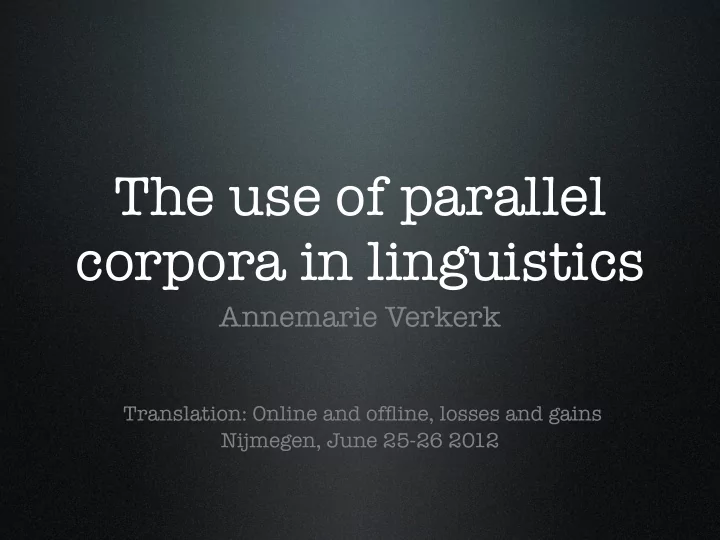

The use of parallel corpora in linguistics Annemarie Verkerk Translation: Online and offline, losses and gains Nijmegen, June 25-26 2012
Parallel corpus a collection of texts that are all translations of a single original text that is made accessible in some way
Parallel text
ParaSol parallel corpus
Famous parallel texts The Bible (1300+ languages) The Universal Declaration of Human Rights (300+ languages) The proceedings of the European Parliament (20+ languages) Cysouw and Wälchli 2007
Parallel corpora in comparative linguistics Why are parallel texts interesting for linguists? - translational equivalence - available in many languages - considered ‘natural’ language - relatively easily attainable data
An example
An example
An example
Parallel corpora in comparative linguistics Stolz (2005, 2006): ‘Le Petit Prince’ in 64 languages comitatives and instrumentals “Then he mopped his forehead with a handkerchief decorated with red squares.”
Parallel corpora in comparative linguistics Van der Auwera et al. (2005): ‘Harry Potter and the chamber of secrets’ in 10 Slavic languages expression of uncertainty: the use of verbs like ‘may’, ‘might’, and ‘could’ versus that of adverbs like ‘maybe’ and ‘perhaps’.
Parallel corpora in comparative linguistics Wälchli (2009): The ‘Gospel according to Mark’ in 100+ languages Lexicalisation in motion events The use of different types of motion verbs seems not to be determined by genetic relationships between languages, but by areal factors
Parallel corpora in comparative linguistics My own corpus: Alice’s adventures in Wonderland / Through the Looking-Glass and what Alice found there (Lewis Carroll) / O Alquimista (Paulo Coelho) in 20+ languages Syntactic and semantic change in motion event encoding in the Indo- European language family
Advantages - usage-based rather than typifying - once properly build, can be used for the investigation of many different topics - comparability of original and translation is helpful for data analysis
Disadvantages - translations into non-European languages are less common and harder to find - the translation might be distorted because of the source text - written language instead of spoken language
Non-comparative uses of parallel corpora deciphering ancient texts machine translation technology
Conclusion Parallel corpora are a great resource for comparative linguists More online accessible parallel corpora would provide a great resource
Thank you! annemarie.verkerk@mpi.nl
Recommend
More recommend